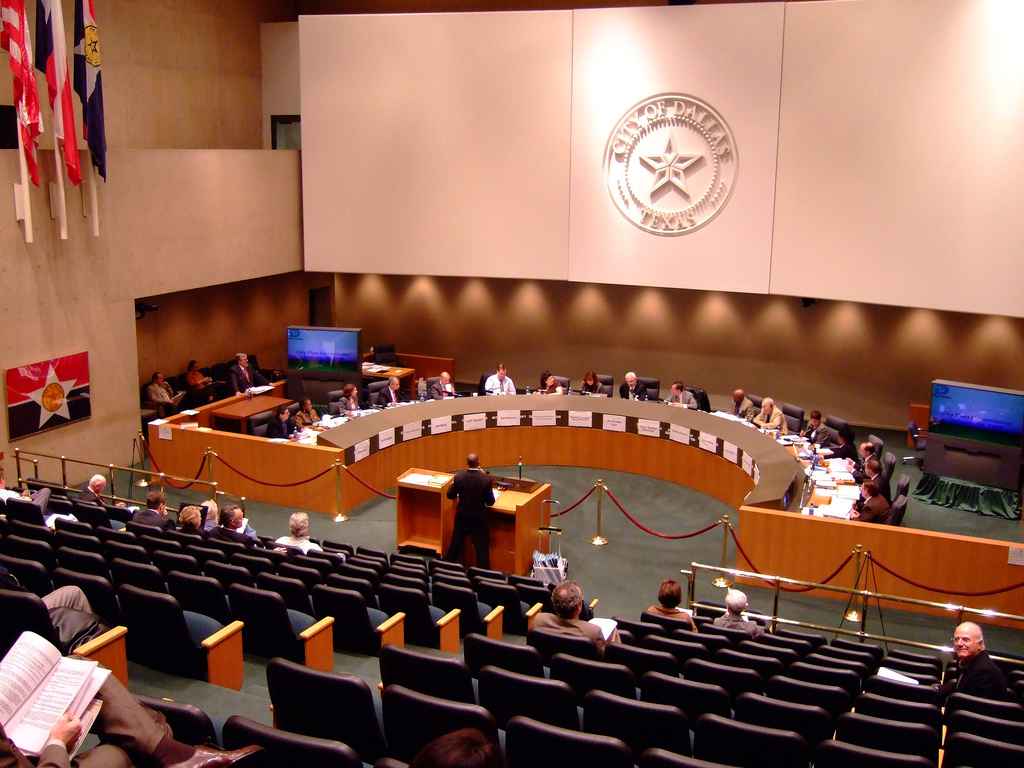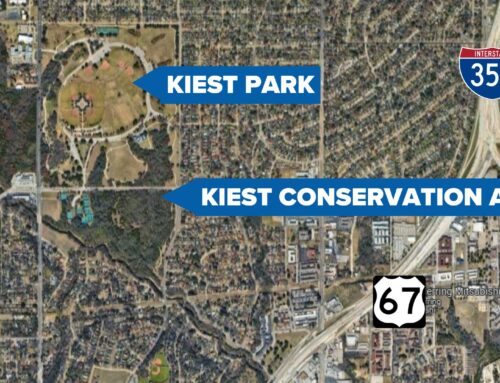If you’re experiencing a bit of city council fatigue this week, we can’t blame you. The council met on Monday and Tuesday to discuss the resignation of City Manager T.C. Broadnax which will go into effect in June, and named Deputy City Manager Kimberly Bizor Tolbert as Broadnax’s interim replacement.
By the time Wednesday’s regularly scheduled council programming rolled around, your attention may have waned.
Still, several major discussions on issues impacting Oak Cliff took place, and we watched the meeting so you don’t have to.
3,000 square-foot rule repealed.
The council unanimously voted to repeal a section of the Dallas Development Code that allows for the demolition of residential structures smaller than 3,000 square feet within a Landmark District.
The ordinance, which went into effect 14 years ago, has been widely criticized for the disproportionate effect it had on historically Black neighborhoods.
“The disproportionate effect this ordinance has had on historic places, including Wheatley Place and 10th Street, there are way too many homes that have been lost that cannot be regained,” Carolyn Howard, executive director of Preservation Dallas, told the council.
According to a memo written by assistant city manager Majed Al-Ghafry, homes in historically Black and Brown neighborhoods have been more likely to be “declared substandard” since the ordinance went into effect, leading to the demolitions. The memo says 35 homes in 10th Street have been torn down because of the ordinance.
“The default for these homes became demolition, rather than consideration for rehabilitation,” Al-Ghafry wrote.
Advocates for 10th Street took turns speaking at the meeting, encouraging the council to be on the “right side of history” with their vote. 10th Street resident Shaun Montgomery said the repeal felt like a “full circle” moment, taking place in the final days of Black History Month.
Prior to the vote, Kate Singleton, Dallas’ chief preservation planner, called the repeal is “bittersweet.” Singleton, who argued against the ordinance when it first went into effect, told the Advocate that it was council member Carolyn King Arnold who “knocked down the door” so the city could run through it.
Just before the vote, Arnold urged her fellow council members to continue working towards initiatives that will benefit the 10th Street district.
“We continue to need you, as we continue to protect as much as we can of that community from rapid gentrification,” Arnold said.
To fund a streetcar or not to fund a streetcar, that is the question.
It’s a conversation that comes up each year, and each year it ruffles feathers.
The DART Streetcar, connecting Bishop Arts to Downtown’s Union Station, was paid for by a Transportation Investment Generating Economic Recovery, or TIGER, Grant, back in 2016. Since then, the city has been contractually obligated to give nearly $2 million a year to DART for the operation and maintenance of the streetcar.
It’s a contract that “never should have been signed,” said council member Tennell Atkins during Wednesday’s meeting.
The council, while obligated to approve the $1,887,492, was split over the validity of the cost.
Ghassan “Gus” Khankarli, director of the city’s Department of Transportation, told the council that the streetcar saw 163,900 riders during fiscal year 2023, and netted $94,000. Council member Cara Mendelsohn voiced concerns that the city is spending “a lot of money for not a lot of riders.”
“I’m just going to keep saying these numbers over and over until it clicks in your mind that we have a lot of fiscal needs, and is this really where we want to spend almost $2 million in a year? We might need to look at raising the cost of riding,” Mendelsohn said.
Council member Chad West (who “inherited the headache” of the streetcar funding, Arnold said) argued that the streetcar has aided in the economic development of the Bishop Arts District. West told the council that hearing a thorough breakdown of the streetcar’s economic impact to the region would be appropriate.
“The bottom line is we have a contractual obligation to pay for it that a previous council had agreed to. The one comment that I do agree with is that reliability is an issue,” West said.
Khankarli confirmed that the streetcar does see semi-regular service interruptions, but DART’s reports of service interruptions do not account for a difference of a 30 second interruption versus a significant interruption lasting five minutes or longer. Without seeing that information, council member Omar Narvaez said, the council’s discussion on the streetcar’s reliability is “incomplete.”
Mendelsohn and Atkins told Khankarli they would be interested in requesting DART begin taking over a portion or all of the contacted maintenance costs. Mendelsohn also said she would be in favor of expanding a TIFF so that funds for the streetcar maintenance no longer come out of the general fund.
City Manager T.C. Broadnax said he does not believe lobbying DART to take over the cost would be successful.
“All that would do is put them in a position to decline us publicly,” Broadnax said.
Downtown Elmwood says “finally.”
After seven years, the council unanimously approved the Downtown Elmwood overlay that advocates say will aid walkability and help small businesses flourish.
Whitney Marsh, president of the Elmwood neighborhood association, spoke to the council from her Downtown Elmwood coffee shop in favor of the motion.
“I think it’s going to be beneficial for a lot of the buildings who’ve just sat empty and are decrepit almost to the point where they’re not able to be rehabilitated because of the zoning holding them back,” Marsh said.
The Elmwood Authorized Hearing was first filed by West in 2018, when he was appointed plan commissioner for District 1. The process was put on the back-burner to make room for the West Oak Cliff Area Plan, which passed in October 2022. The overlay implements recommendations from WOCAP such as encouraging walkability and fixing parking requirements that many Elmwood residents believe have held the neighborhood back.
West told the council the Downtown Elmwood overlay is the first of four hearings he expects will come from WOCAP.






